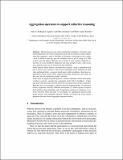Por favor, use este identificador para citar o enlazar a este item:
http://hdl.handle.net/10261/156637COMPARTIR / EXPORTAR:
 SHARE
BASE SHARE
BASE
|
|
| Visualizar otros formatos: MARC | Dublin Core | RDF | ORE | MODS | METS | DIDL | DATACITE | |

| Título: | Aggregation Operators to Support Collective Reasoning |
Autor: | Rodríguez-Aguilar, Juan Antonio CSIC ORCID CVN ; Serramia, Marc CSIC ORCID ; López-Sánchez, Maite CSIC ORCID | Palabras clave: | Collective decision Virtual communities Social choice Scarce resources Continuous opinions Aggregation operators |
Fecha de publicación: | 2016 | Editor: | Springer Nature | Citación: | Modeling Decisions for Artificial Intelligence. MDAI 2016. LNAI 9880 (2016): 3-14 | Resumen: | Moderation poses one of the main Internet challenges. Currently, many Internet platforms and virtual communities deal with it by intensive human labour, some big companies-such as YouTube or Facebook-hire people to do it, others-such as 4chan or fanscup-just ask volunteer users to get in charge of it. But in most cases the policies that they use to decide if some contents should be removed or if a user should be banned are not clear enough to users. And, in any case, typically users are not involved in their definition. Nobel laureate Elinor Ostrom concluded that societies-such as institutions that had to share scarce resources-that involve individuals in the definition of their rules performed better-resources lasted more or did not deplete-than those organisations whose norms where imposed externally. Democracy also relies on this same idea of considering peoples’ opinions. In this vein, we argue that participants in a virtual community will be more prone to behave correctly-and thus the community itself will be “healthier”-if they take part in the decisions about the norms of coexistence that rule the community. With this aim, we investigate a collective decision framework that: (1) structures (relate) arguments issued by different participants; (2) allows agents to express their opinions about arguments; and (3) aggregates opinions to synthesise a collective decision. More precisely, we investigate two aggregation operators that merge discrete and continuous opinions. Finally, we analyse the social choice properties that our discrete aggregator operator satisfies. © Springer International Publishing Switzerland 2016. | URI: | http://hdl.handle.net/10261/156637 | DOI: | 10.1007/978-3-319-45656-0_1 | Identificadores: | doi: 10.1007/978-3-319-45656-0_1 issn: 03029743 isbn: 978-331945655-3 |
| Aparece en las colecciones: | (IIIA) Comunicaciones congresos |
Ficheros en este ítem:
| Fichero | Descripción | Tamaño | Formato | |
|---|---|---|---|---|
| MDAI2016_LNAI9880_3-14.pdf | 395,57 kB | Adobe PDF |  Visualizar/Abrir |
CORE Recommender
WEB OF SCIENCETM
Citations
1
checked on 23-nov-2021
Page view(s)
260
checked on 18-abr-2024
Download(s)
256
checked on 18-abr-2024
Google ScholarTM
Check
Altmetric
Altmetric
NOTA: Los ítems de Digital.CSIC están protegidos por copyright, con todos los derechos reservados, a menos que se indique lo contrario.
